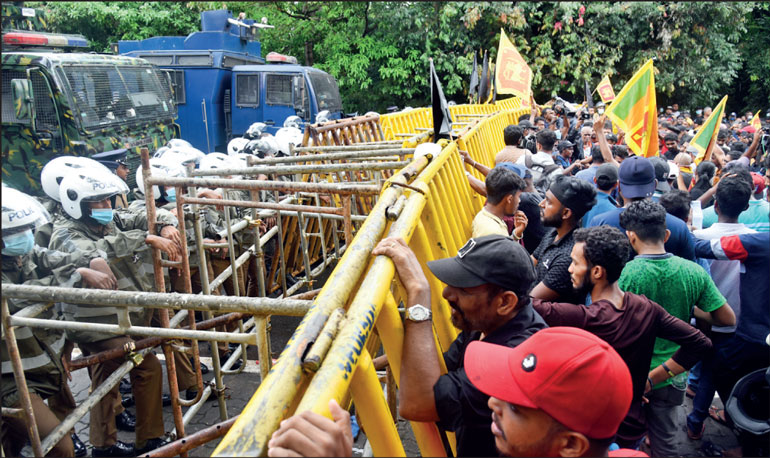Friday Feb 13, 2026
Friday Feb 13, 2026
Saturday, 7 May 2022 00:15 - - {{hitsCtrl.values.hits}}

Parliament will need barricades until such time it decides that politics is the process of solving public problems - Pic by Ruwan Walpola
“The slave begins by demanding justice and ends by wanting to wear a crown. He must dominate in his turn”
– Albert Camus’s Rebel –
 Barricading the roads leading to Parliament is a desperate act of a regime that has lost its capacity for reason.
Barricading the roads leading to Parliament is a desperate act of a regime that has lost its capacity for reason.
A barricade has two sides. Truth has only one side.
Every social rebellion is driven by an overarching unity of the people.
Semi-permanent barricades have been put up on all approaches to Parliament. A regime that survives purely on its capacity for brute force to contain public discontent has grudgingly acknowledged that it is fast running out of options.
Yesterday I watched a senior police officer exuding intimidatory machismo ordering a hapless group of cops to bundle a dozen protestors in to a bus on parliamentary grounds. Later in the day the protestors were released on bail.
A youth forcibly put on the police bus screamed, “Tomorrow your family too will need food.”
It is too much to expect the slow-witted but senior policeman to have read ‘Les miserable’. The youth in the bus was making a cry that is long known to civilised society voiced in Victor Hugo’s immortal words: “When the beating of your heart echoes the beating of the drums, there is a life about to start when tomorrow comes!”
In 1956 the people of this land elected a parliament that truly reflected the yearnings of the ordinary people. I was 14 years old. It was called the age of the common man. Its architect was S.W.R.D. Bandaranaike whose giant statue was recently ‘blindfolded’ by protestors at ‘Gotagogama’ with a piece of black cloth. For good measure the protestors left a poster at its base urging the man to wake up.
There is indeed some poetry in that irreverent hark back to our post-independence history. 1956 unleashed the centrifugal force that propelled many penniless protectors of public interest in to politics.
Bandaranaike was the post-independence leader who foresaw the social and cultural forces that demanded a new order.
He facilitated social change, but he had no idea of the shape and scope of the change. On becoming Prime Minister S.W.R.D. said, “I look upon our government as in some way laying the foundation in preparing the way for a more progressive line of thinking and action in this country.”
The ‘Gotagogama’ protestors want poor Bandaranaike to wake up to the sad truth of what his legacy has turned into.
The current Parliament has a sizeable number of descendants of those who entered parliament in 1956. Quite apart from the social transformation, 1956 was the watershed happening that made politics a profitable occupation that could be safely passed on from one generation to the other.
A good case in point is that of the son of the Boralugoda lion who has got his lion cub into parliament through the national list.
The grandson of the Kandy Street poet who entered parliament in 1956 has earned cabinet rank in the recent reshuffle. The protestors want good old S.W.R.D. Bandaranaike to wake up to the cruel irony of the offspring of his faithful follower who crossed the aisle with him feeding ‘Rottweilers’ and ‘Angora cats’ while ordinary mothers line up for milk powder at half empty shops.
The truth is that the people want both Mahinda and Gotabaya to go. The ordinary people have passed the endurance levels of exasperation.
The semi-permanent barricades on the approaches to Parliament is a recognition of that very inconvenient truth.
The politicians must learn from the protestors. They don’t have an overpowering leader. They are moved by conviction. Parliament is on a different wavelength. They are busy mapping out a process to construct a new leadership. The brothers are in no hurry. They have been in this business and know how it works.
Seeking a solution to the economic crisis is the least of their concerns. Surviving the crisis while saving their boodle is the existential imperative they just cannot afford to ignore.
In the kind of politics they know, leadership is the ultimate trophy. People can be hungry for food. Politics is different. The hunger for power is what drives it.
You cannot lead without speaking. That is why all contenders are speaking nonstop in the talk shop where rhetoric has thrived at the expense of practical common sense.
Parliament will need barricades until such time it decides that politics is the process of solving public problems.
We don’t need a great leader. We need good leaders who are honest about the predicament we are in and are ready to explore transparent solutions.
The proceedings in Parliament clearly indicate that there is no one who can claim to have mastery of the situation.
The Minister of Finance and Justice is a clever man. He made a very honest analysis of the crisis. That said we must caution him. Honesty is a not a byproduct of a crisis.
Either you have it or you don’t. He was once the ‘mouthpiece’ in Court. Now, in Parliament, he describes himself as the ‘Nightwatchman’. Give the devil his due. So far he has acquitted himself with great a sangfroid and unmistakable elan.
His last peroration in Parliament was a balancing act. It failed to clearly define the magnitude of the crisis. Stability is something that is urgently needed. Achieving the semblance of political stability requires not numbers in parliament but civic trust in the country. The brothers he served so diligently are not trusted by the public.
The Nightwatchman must realise that he cannot be the nightwatchman and ‘mouthpiece’ in parallel.
Other than perpetuating the power grip of the Rajapaksa family, the ‘Pohottuwa’ party has no cohesive ideology. The ‘Nightwatchman’ Ali Sabry on the other hand is an accident – the product of a combination of circumstances which has made him pivotal in these processes of locating sanity amidst madness.
A barricaded parliament is not the anvil on which a national consensus is forged.